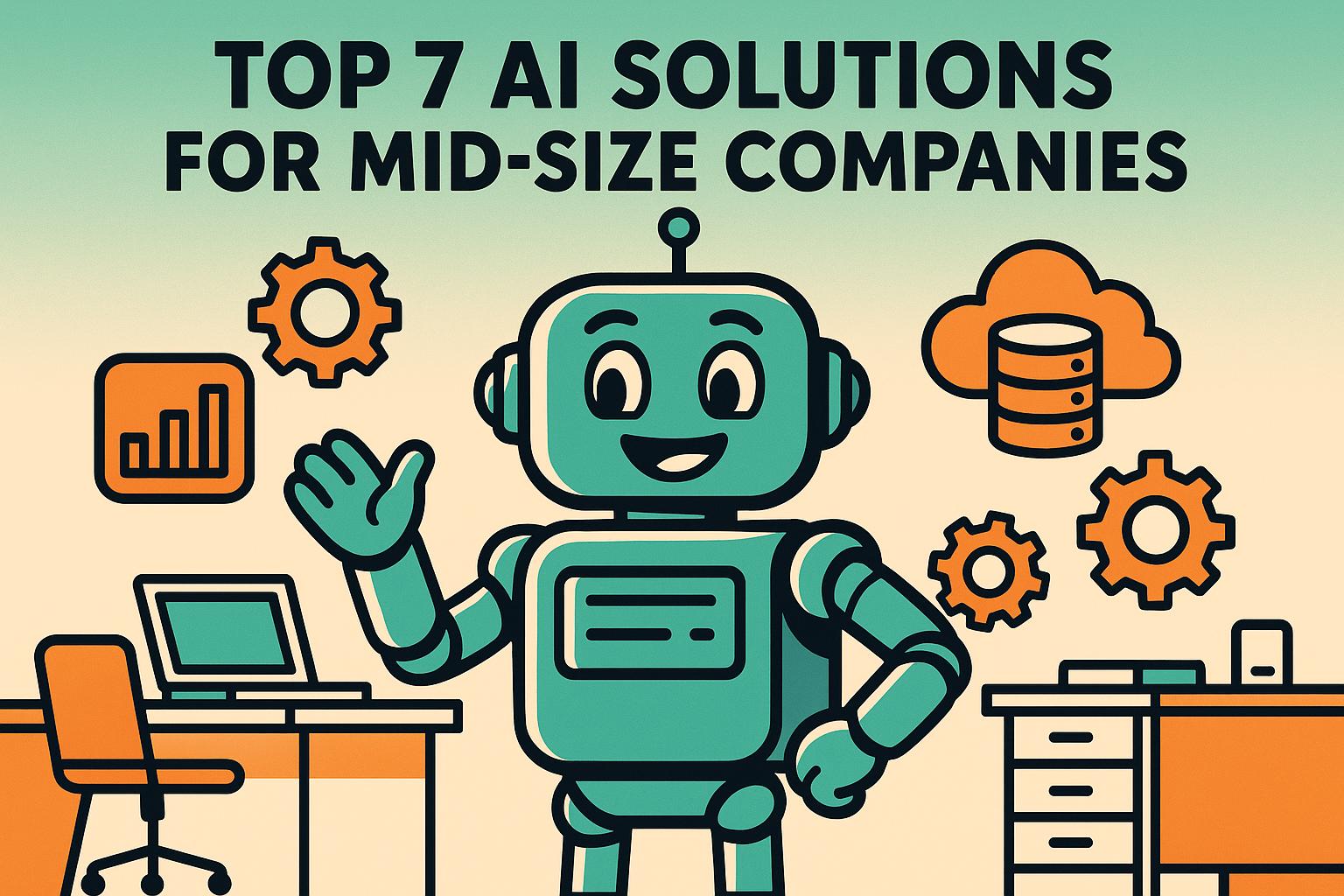
Top 7 AI Solutions for Mid-Size Companies
Top 7 AI Solutions for Mid-Size Companies
AI is no longer reserved for large corporations. Mid-size companies can now leverage cost-effective, scalable tools to improve operations, customer service, and decision-making. Here's a look at seven AI platforms tailored to these businesses:
- AskMiguel.ai: Custom-built AI tools for tasks like CRM, marketing automation, and workflow optimization. Offers tailored pricing and ongoing support.
- Microsoft Azure AI: Cloud-based platform with pre-trained models for speech, vision, and language processing. Features pay-as-you-go pricing and seamless integration with Microsoft tools.
- IBM Watson: Modular AI tools for customer service, supply chain optimization, and financial analysis. Known for its flexible pricing and hybrid cloud options.
- Google Cloud AI: Scalable solutions with a pay-as-you-go model. Offers tools for text analysis, image recognition, and predictive analytics.
- Sisense: AI-driven analytics platform with tools like AutoML for data insights. Features subscription pricing and extensive training resources.
- Hugging Face: Open-source library with pre-trained models for NLP and more. Freemium pricing makes it accessible for budget-conscious businesses.
- PyTorch: Open-source framework for custom AI development. Free to use but requires technical expertise.
Each solution addresses specific needs, from automating tasks to enhancing analytics. Choose based on your budget, technical capabilities, and business goals.
Quick Comparison
| Solution | Pricing Model | Key Features | Best For |
|---|---|---|---|
| AskMiguel.ai | Custom pricing | Tailored tools, full-service integration | Custom AI needs |
| Microsoft Azure AI | Pay-as-you-go | Pre-trained models, Microsoft integration | Cloud-based AI for growth |
| IBM Watson | Subscription + usage | Modular tools, hybrid cloud options | Scalable AI for various tasks |
| Google Cloud AI | Pay-as-you-go | Scalable tools, predictive analytics | Cost-effective, data-heavy tasks |
| Sisense | Subscription | AutoML, analytics-focused | Data insights and visualization |
| Hugging Face | Freemium | Pre-trained NLP models, open-source | NLP and budget-conscious users |
| PyTorch | Free (open-source) | Custom AI development, dynamic computation | Advanced, tailored AI projects |
Next Steps: Start small with a pilot project, focus on clean data, and scale gradually. Investing in AI now prepares your business for future growth while staying competitive.
Why Mid-Sized Companies Are Perfect for AI and Automation
Why AI Implementation Differs for Mid-Size Companies
Mid-size companies face a unique challenge: they aim for significant growth while managing tighter resources. Unlike large corporations with dedicated AI teams or smaller businesses relying on simpler automation tools, mid-size firms must carefully navigate budget, talent, and scalability concerns.
Budget limitations mean these companies need AI solutions that show measurable results quickly. There's little room for expensive experiments or long-term projects that don’t immediately impact the bottom line.
Hiring full-time AI specialists is often out of reach, so mid-size companies benefit from pre-built, user-friendly AI models that their existing staff can handle. These solutions must also scale effectively as the company grows, accommodating increasing data and user demands.
AI can bring value across multiple areas, such as:
- Operations: Predictive maintenance to reduce downtime.
- Marketing: Better customer segmentation for targeted campaigns.
- HR: Automating recruitment and employee management tasks.
- Finance: Strengthening controls and streamlining processes.
- Customer Service: Improving response times and overall efficiency.
To meet these diverse needs, mid-size companies often adopt phased AI strategies. They start with smaller pilot projects, using cloud-based platforms and subscription models that fit within their cash flow and resources. This incremental approach allows them to test AI solutions before committing fully.
Integration is another key factor. Many mid-size companies rely on various software tools - like CRM, ERP, and accounting systems - that need to work together seamlessly. Without proper integration, data silos can form, undermining the effectiveness of AI initiatives.
Ultimately, mid-size companies prioritize quick, tangible outcomes. AI solutions that deliver fast results and align with their operational realities are essential for driving success.
1. AskMiguel.ai
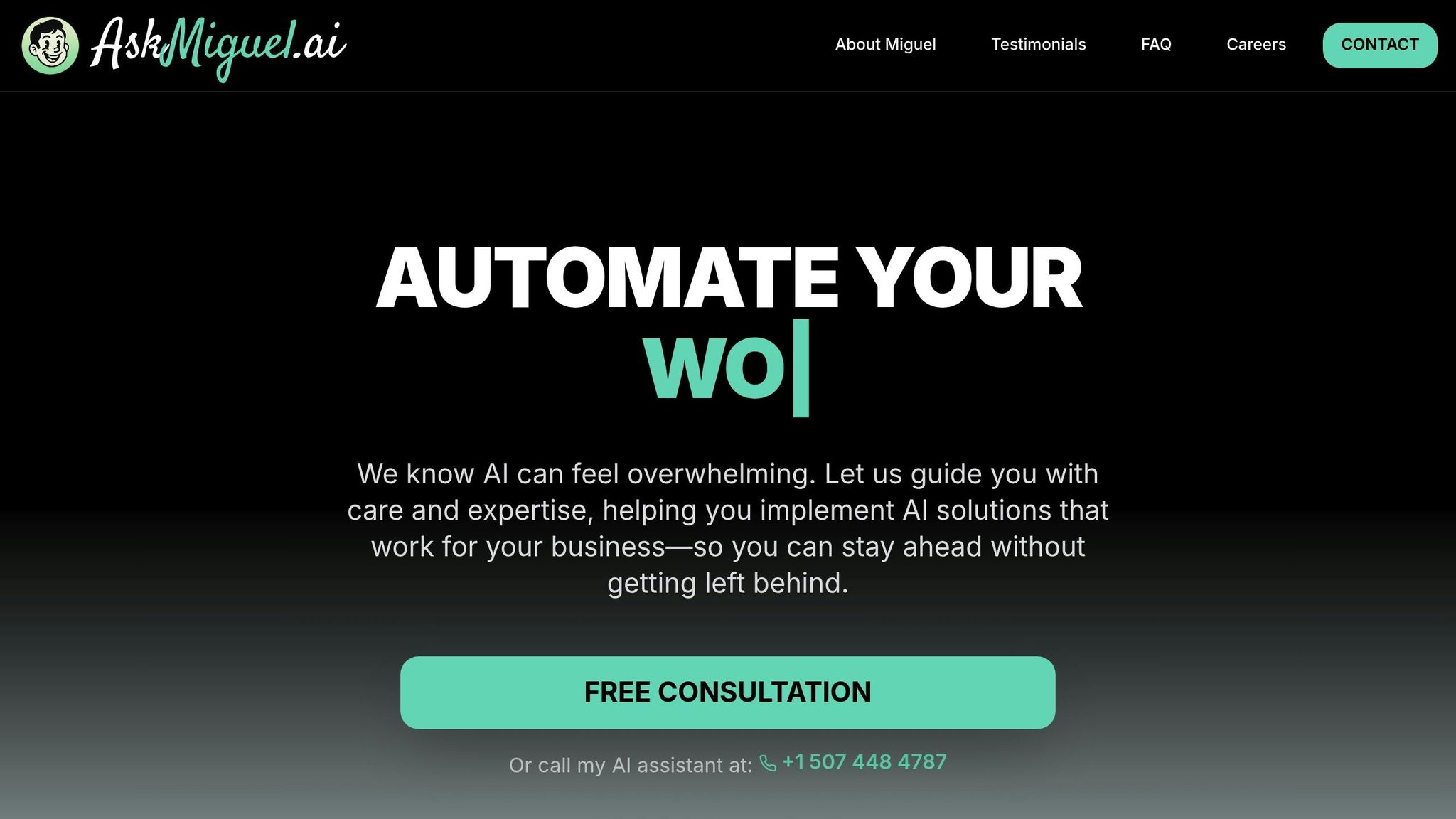
AskMiguel.ai is a veteran-owned AI agency that specializes in creating custom AI solutions tailored to the unique needs of businesses. Their services cover everything from automation and workflow optimization to developing data-driven products and specialized AI tools. They take care of the entire process - from scoping and prototyping to deployment and ongoing refinement - ensuring their solutions align perfectly with the needs of mid-size companies. This approach makes it easier for businesses to adopt scalable and budget-friendly AI solutions that can grow alongside them.
Solutions That Grow With Your Business
AskMiguel.ai focuses on building tools that evolve with your business. Their projects include AI-driven CRM systems, marketing automation tools, and business applications designed to address a variety of operational challenges. This flexibility ensures their solutions remain relevant as your business scales, offering competitive pricing and long-term support.
Budget-Friendly Investment Options
Understanding the financial constraints of mid-size companies, AskMiguel.ai offers pricing tailored to project needs and budgets. They go beyond just affordability, providing added value through continuous support to ensure businesses get the most out of their investment.
Dedicated Support and Learning Resources
AskMiguel.ai doesn’t just deliver technical solutions - they also provide ongoing AI consulting and access to free resources like tutorials, guides, and expert insights. These tools help businesses build internal knowledge and maximize the benefits of their AI investments, ensuring long-term success.
2. Microsoft Azure AI
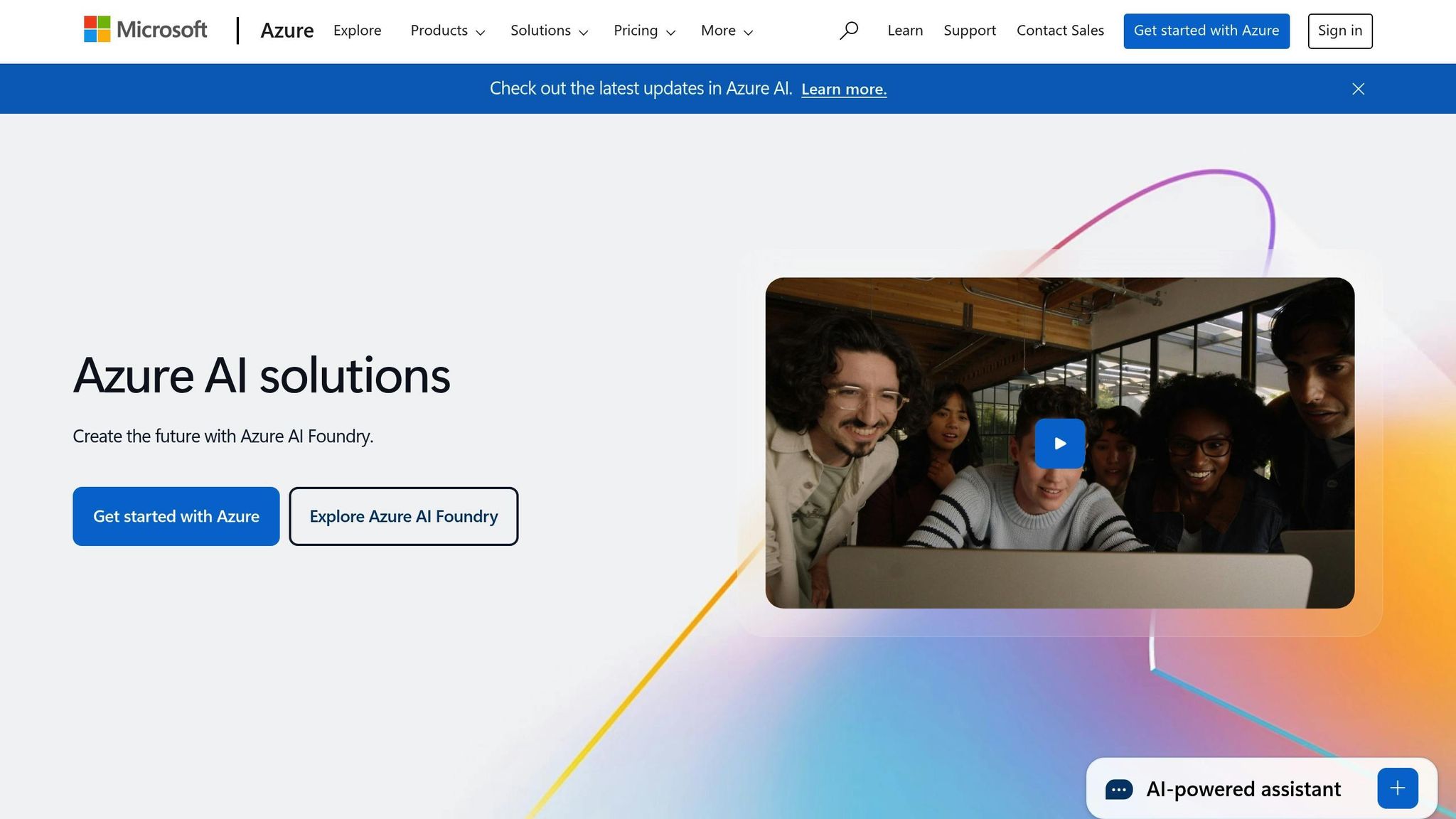
Microsoft Azure AI is a cloud-based platform designed to bring advanced AI capabilities to businesses by combining ready-to-use services with tools for building custom machine learning models. This makes it possible for mid-size companies to adopt sophisticated AI solutions without needing deep technical expertise or large upfront investments.
What sets Azure AI apart is its pay-as-you-go pricing model and its ability to integrate seamlessly with Microsoft tools many companies already use. The platform includes services like Azure Cognitive Services for tasks like vision, speech, and language processing, as well as Azure Machine Learning for creating tailored models. Together, these features make it easier for mid-size businesses to incorporate AI into their operations without major disruptions or costs.
Scalability for Mid-Size Businesses
Azure AI offers automatic scaling, meaning businesses can start small and grow their AI capabilities as needed. The platform adjusts computing resources based on demand, so companies only pay for what they use. This eliminates the need for expensive hardware or software licenses, making AI adoption more accessible.
For instance, a company might begin with basic tools like chatbots or document processing and later expand into more advanced applications like predictive analytics or computer vision. This flexibility ensures businesses can scale up their AI capabilities as they grow, without the burden of significant upfront investments.
Additionally, Azure AI's serverless options remove the hassle of infrastructure management. Teams can focus on developing AI solutions instead of worrying about server maintenance, updates, or capacity planning.
Simple Integration with Existing Systems
Azure AI's ability to integrate with familiar tools and systems reduces the complexity of implementation. It works seamlessly with Microsoft 365 and other business applications using pre-built connectors, REST APIs, and SDKs. This allows companies to quickly incorporate AI into their existing workflows and data sources.
For businesses with unique needs, Azure AI also supports custom integrations. Its well-documented APIs make it easy for in-house IT teams or external consultants to connect AI capabilities to proprietary systems or specialized software, even without extensive technical expertise.
Budget-Friendly Options for Mid-Size Companies
Azure AI's consumption-based pricing ensures businesses only pay for the resources they use, which is especially beneficial for mid-size companies with varying AI demands. During slower periods, this approach can lead to significant cost savings compared to fixed monthly fees.
The platform also offers free tiers for many services, allowing companies to experiment and prototype AI solutions without financial risk. These free options include monthly allowances for tools like text analysis, image recognition, and speech processing, enabling businesses to test ideas before committing to paid plans.
To help manage costs, Azure AI provides cost management tools that include spending alerts, budget limits, and detailed usage reports. These features help businesses optimize their AI investments and avoid unexpected expenses.
Support and Training Resources
Microsoft ensures businesses have access to extensive resources for getting started with AI. The platform includes detailed documentation and tutorials, complete with step-by-step guides, code examples, and best practices to help teams apply AI to common business challenges.
For technical support, Azure AI offers 24/7 assistance with options ranging from basic online help to premium support that includes faster response times and phone assistance for critical issues.
Additionally, companies can access Microsoft Learn, a free online training platform with structured courses on AI and machine learning. These learning paths help internal teams build the skills needed to implement and maintain AI solutions, reducing the need for external consultants over time.
3. IBM Watson
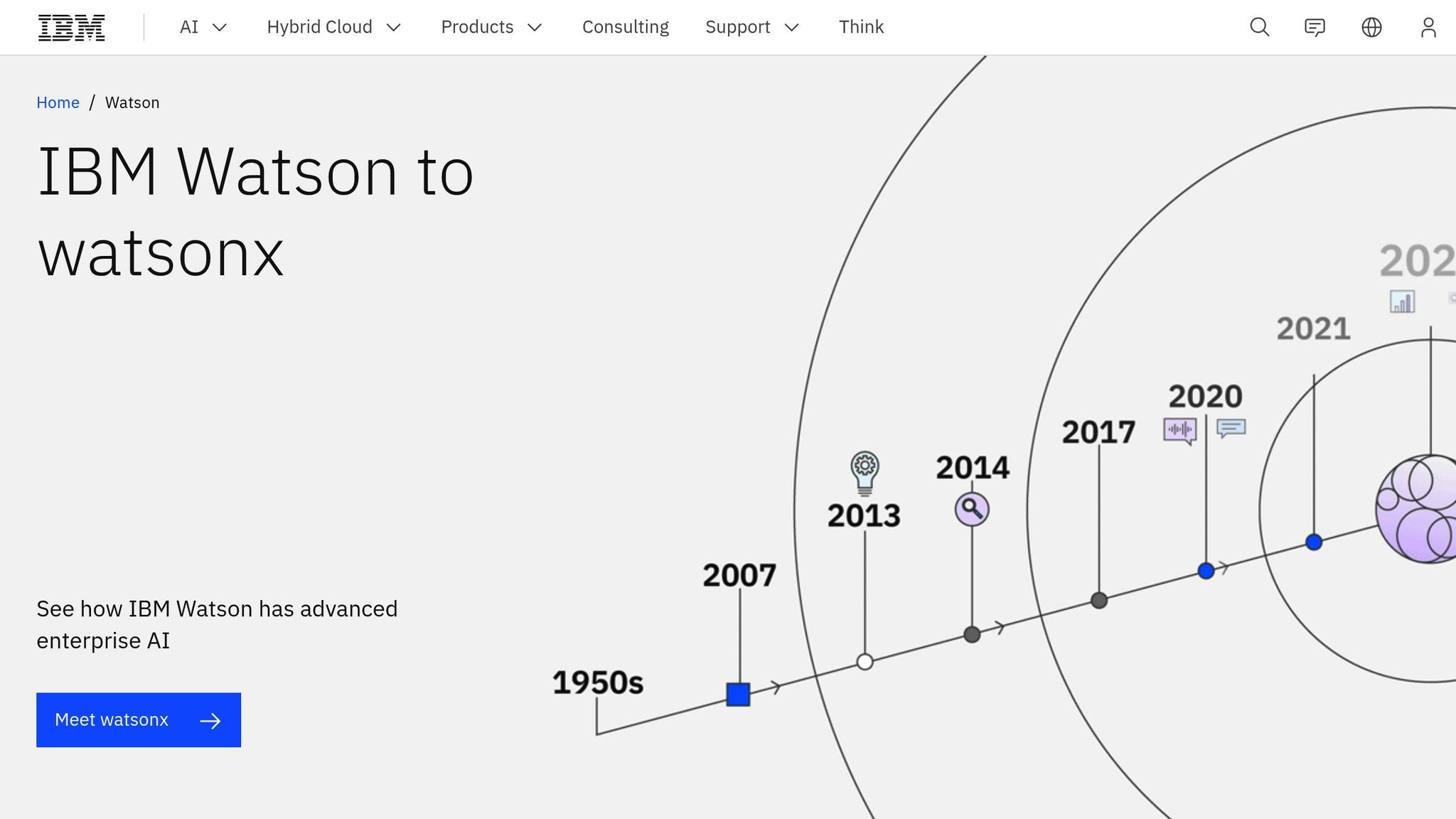
IBM Watson is a powerful AI platform designed for businesses, offering both pre-built tools and customizable options. It combines natural language processing, machine learning, and data analytics to tackle specific business challenges. From automating customer service to optimizing supply chains and conducting financial analyses, Watson provides solutions that can adapt as your business grows.
Flexible Growth for Mid-Size Businesses
Watson’s modular setup lets businesses start small and expand gradually. For instance, a company might begin with Watson Assistant and, as their needs evolve, add tools like Watson Discovery or Watson Studio. This "pay-as-you-grow" model allows businesses to scale at their own pace.
This approach is particularly appealing to mid-size companies that need to show measurable results before committing to larger AI investments. Businesses can test Watson in specific areas, gauge its performance, and then roll out successful solutions to other departments.
Watson also features cloud-based auto-scaling, which adjusts resources automatically to match demand. During busy times, it ramps up computing power to maintain performance, then scales back during slower periods to save costs.
Seamless Integration with Existing Systems
One of Watson's strengths is its ability to integrate smoothly with existing tools. It offers REST APIs, SDKs, and pre-built connectors for platforms like Salesforce, SAP, and Microsoft Office 365. These connectors simplify the process, cutting down implementation times from months to just weeks.
For businesses concerned about security and compliance, Watson’s hybrid cloud capabilities offer flexibility. Sensitive data can remain on-premises while still taking advantage of Watson’s AI features. Alternatively, companies can use Watson’s cloud services, which include enhanced security options tailored to meet industry-specific regulations.
Budget-Friendly Options for Mid-Size Companies
IBM has designed Watson’s pricing to be accessible for companies with smaller budgets. Its tiered service plans allow businesses to start with basic features and scale up as needed. Many services even include free starter plans, making it easy to experiment without upfront costs.
Watson’s pay-per-transaction model is another cost-saving feature. For example, Watson Assistant charges based on the number of conversations, so businesses only pay for what they use - saving money during slower periods.
Additionally, Watson’s pre-trained models for tasks like sentiment analysis, language translation, and document classification significantly reduce development time and costs. Instead of spending months building custom AI models, businesses can quickly deploy Watson’s ready-made solutions.
Comprehensive Support and Training
IBM supports Watson users with a range of resources to ensure smooth implementation. The Watson Developer Community offers extensive documentation, code samples, and tutorials, enabling in-house teams to get up to speed quickly without needing expensive consultants.
IBM also provides technical support options, from community forums to dedicated representatives. For mid-size companies, standard phone and email support are available during business hours, with upgrades to 24/7 support for critical needs.
For learning, the Watson Academy offers free online courses tailored to both business users and technical teams. These courses cover everything from AI basics to advanced strategies, helping companies build internal expertise and reduce reliance on external specialists over time.
4. Google Cloud AI
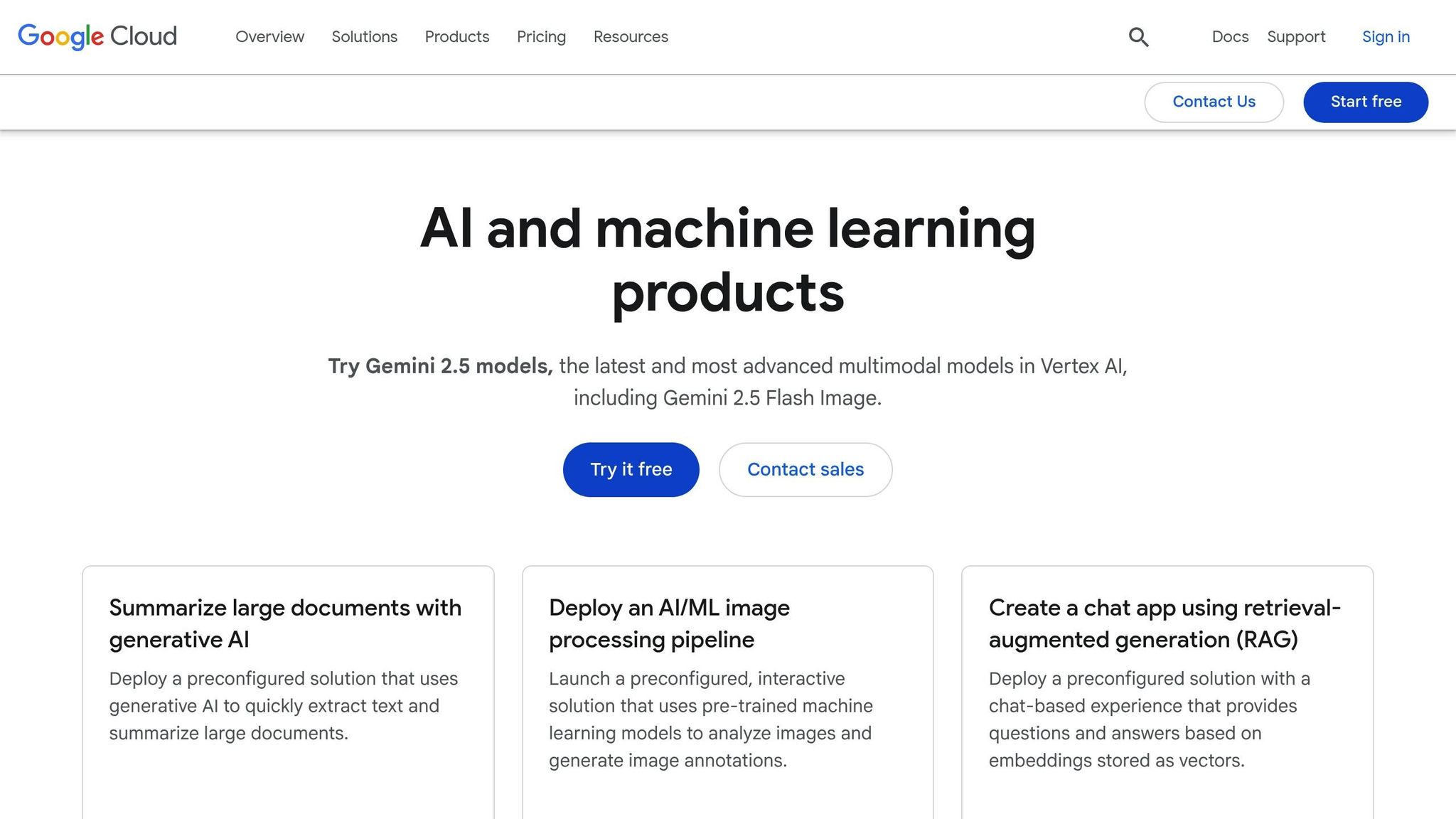
Google Cloud AI provides a budget-friendly option for businesses, thanks to its pay-as-you-go pricing model. This approach allows companies to manage their expenses by only paying for the resources they actually use. With minimal upfront investment and the ability to scale effortlessly, it’s a practical choice for organizations looking to optimize costs.
Scalability and Cost-Effectiveness
One of the standout features of Google Cloud AI is its ability to scale quickly to match changing business needs. Over a three-year period, the platform has been shown to deliver an impressive 727% return on investment (ROI), with an average payback period of just eight months. Additionally, it generates $205,000 in productivity value for every 1,000 employees. Flexible pricing options, including tailored contracts and discounts, add even more value to this cost-effective solution.
sbb-itb-fc18705
5. Sisense
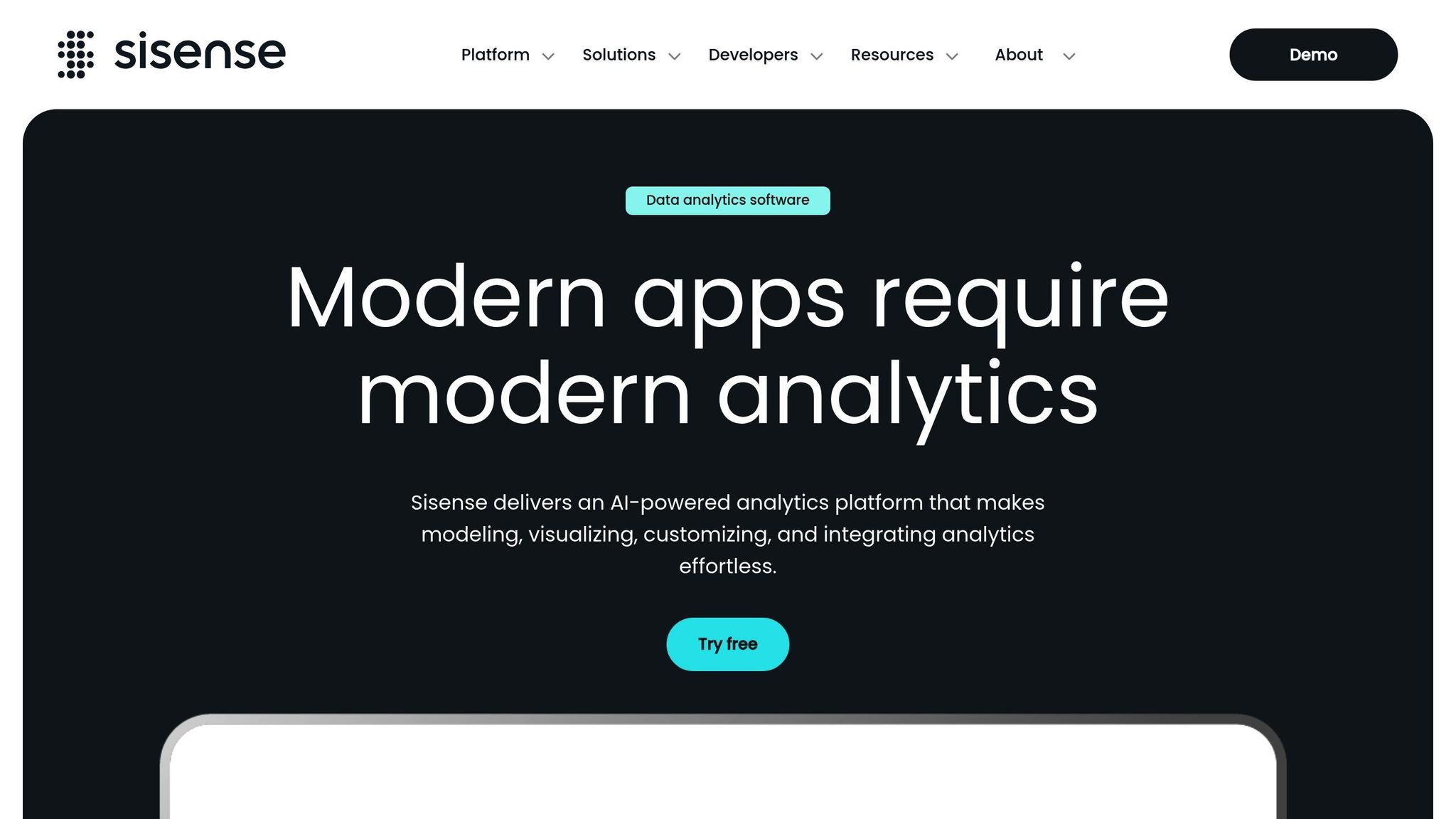
Sisense uses AI to provide advanced analytics and actionable insights tailored to mid-size companies. A standout feature is its Fusion technology, which integrates automated machine learning (AutoML) into existing workflows with ease. For businesses adopting AutoML, expert guidance is available to ensure a smooth transition.
Support and Training Resources
Sisense offers a range of learning tools through its Sisense Academy. This program includes structured courses, certifications, videos, and webinars designed for various roles, such as administrators, data designers, and dashboard designers. There's even a dedicated "Artificial Intelligence" course to help teams get up to speed on AI capabilities.
The Sisense Community adds another layer of support by connecting creators, developers, and data professionals through forums, live events, and real-time interaction channels. This collaboration encourages sharing of ideas and problem-solving.
For immediate assistance, Sisense provides an AI-powered chatbot on its Community Support Portal. The chatbot uses official documentation and community forum content to address questions and can escalate issues by creating a support case if necessary.
Beyond its training and community resources, Sisense offers flexible pricing options to help mid-size companies manage costs effectively.
Budget-Friendly Options for Mid-Size Companies
Sisense ensures businesses can maximize their investment by offering webinars, product demos, and detailed documentation. For companies seeking more tailored learning, third-party training options are available, including customized corporate training with post-training support. The platform's extensive documentation serves as a go-to resource, covering everything from data administration and modeling to dashboard creation and troubleshooting.
6. Hugging Face
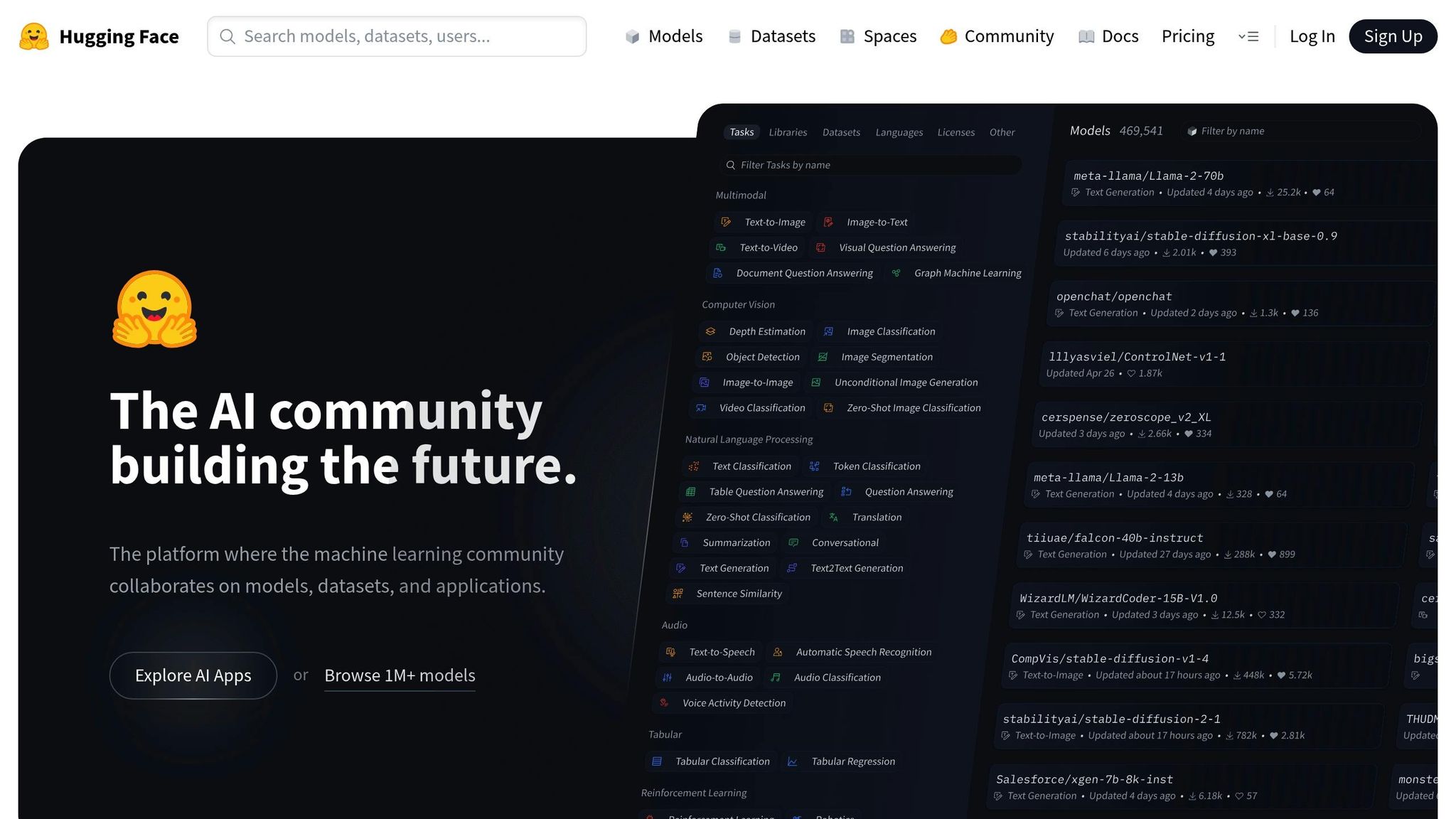
Hugging Face is an open-source platform that provides a vast library of pre-trained AI models. This allows mid-size companies to integrate features like natural language processing, computer vision, and audio analysis without having to build everything from the ground up.
Scalability for Growing Businesses
Hugging Face's extensive model repository makes it easy for businesses to expand their AI capabilities as they grow. Its modular Hub architecture lets companies start small - using models for tasks like sentiment analysis or document classification - and expand over time. With the AutoTrain feature, even teams with minimal AI expertise can train custom models efficiently, tailoring solutions to their specific needs.
Seamless Integration with Current Systems
Hugging Face simplifies integration with its user-friendly APIs and SDKs available in Python and JavaScript. The Transformers library offers a standardized interface, making it easy for developers to switch between models without rewriting large portions of code. Additionally, the platform includes collaborative Spaces where teams can deploy and share AI applications for internal projects, prototyping, or presentations. This setup reduces complexity and helps businesses stay budget-conscious.
Budget-Friendly Options for Mid-Size Companies
Hugging Face operates on a freemium model, allowing companies to test and validate AI use cases without upfront costs. This approach enables businesses to experiment with tools and features before committing to a paid plan, making it accessible even for those with tighter budgets.
Resources and Community Support
Hugging Face offers a wealth of resources to help users at all skill levels. Its detailed documentation, tutorials, and training courses cover topics like natural language processing and machine learning. The platform also hosts an active community, along with regular webinars and workshops, ensuring businesses can stay updated on the latest AI trends and practices.
7. PyTorch
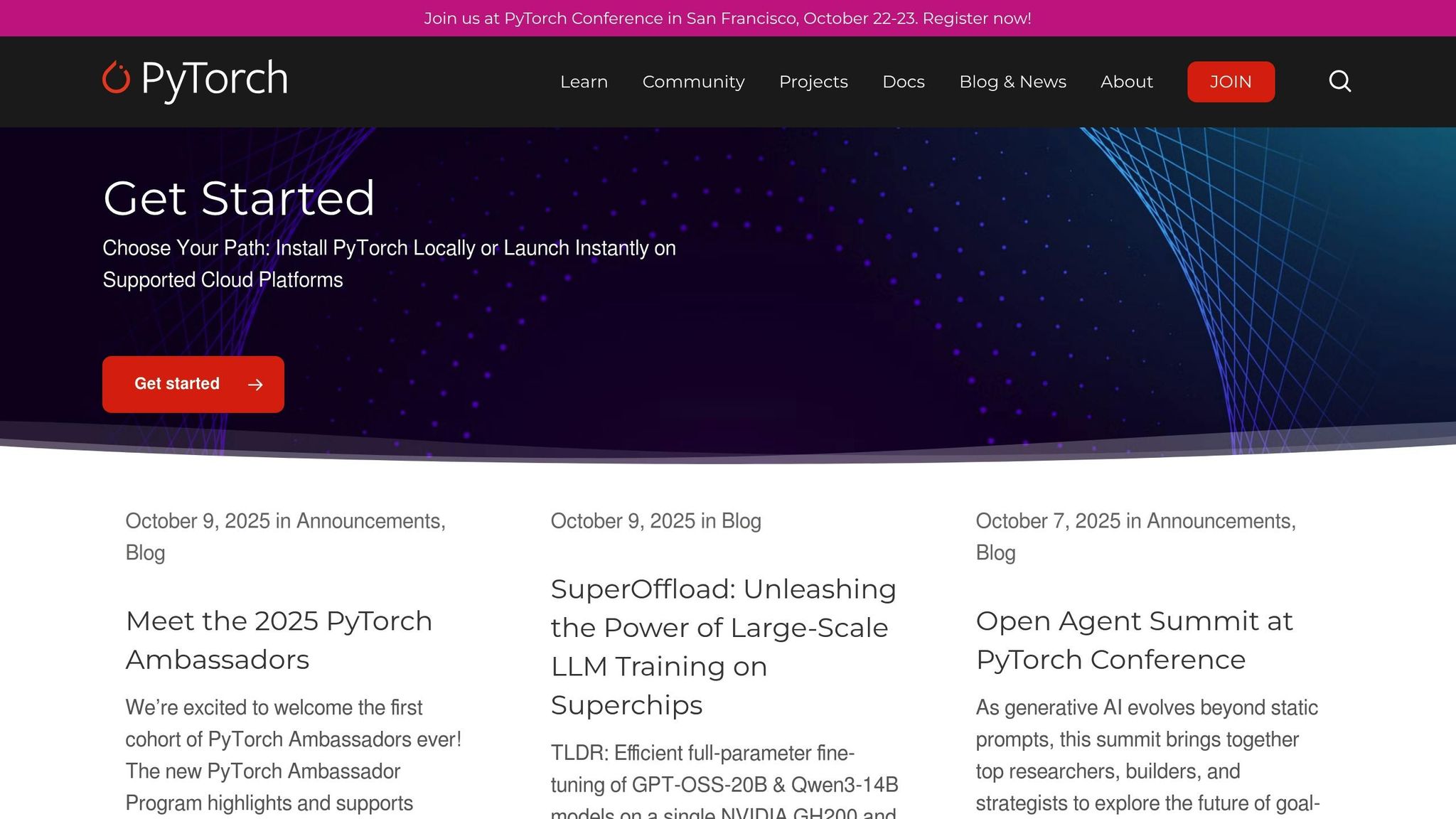
PyTorch is an open-source machine learning framework that empowers mid-size companies to craft tailored AI solutions for their unique business challenges. Instead of relying on pre-built platforms, PyTorch offers the essential tools and libraries needed to create everything from recommendation systems to predictive analytics, giving businesses full control over their AI projects. Let’s dive into how PyTorch supports scalability, integration, cost management, and training resources.
Scalability for Mid-Size Businesses
One of PyTorch's standout features is its dynamic computation graphs, which allow developers to tweak models in real time without starting from scratch. This adaptability is a game-changer for mid-size businesses that need to respond quickly to shifting priorities. For instance, a company might begin with basic tasks like customer segmentation and later expand into advanced areas such as real-time fraud detection or optimizing supply chains.
Additionally, PyTorch supports distributed training, making it easy to scale from a single server setup to more robust cloud-based systems - all without needing to overhaul the core AI logic.
Seamless Integration with Existing Systems
PyTorch’s Python-first approach ensures that it works well with existing systems and commonly used data formats like CSV, JSON, and SQL. This makes it easier for businesses to plug PyTorch into their workflows without major overhauls.
For production deployment, TorchServe simplifies the process by offering REST APIs that connect effortlessly with enterprise software, ensuring smooth integration into existing infrastructures.
Budget-Friendly for Mid-Size Companies
As a free, open-source framework, PyTorch eliminates licensing fees, meaning businesses only need to budget for computing resources. Whether using on-premises servers or cloud solutions, this flexibility helps companies keep costs under control.
PyTorch also makes the most of standard hardware, delivering strong AI performance without requiring high-end systems. And when additional computing power is needed, transitioning to cloud-based resources is straightforward and cost-efficient.
Comprehensive Support and Training Resources
PyTorch offers a wealth of resources to help businesses hit the ground running. From detailed documentation and step-by-step guides to a vibrant community of developers, there’s no shortage of support. Pre-built model libraries are also available, enabling faster implementation and reducing the need for outside expertise.
AI Solutions Comparison: Features and Costs
After reviewing detailed platform overviews, here's a streamlined comparison to help you weigh features and pricing when choosing an AI solution.
Custom AI Development with AskMiguel.ai
AskMiguel.ai operates on a custom project-based pricing model tailored to meet specific needs. This setup offers a high degree of personalization and includes full-service integration - covering everything from scoping and prototyping to deployment and ongoing optimization. It's a great choice for businesses looking for a comprehensive, all-in-one AI solution.
Enterprise Cloud Platforms (Microsoft Azure AI, IBM Watson, and Google Cloud AI)
These platforms utilize a pay-as-you-go pricing structure, with costs scaling based on usage and business size. They come with robust infrastructure, detailed documentation, and professional support, making them ideal for mid-sized companies aiming to scale their operations while leveraging in-house technical expertise.
Business Intelligence Solutions (Sisense)
Sisense uses a subscription-based model, catering to teams focused on data analytics and visualization. While pricing depends on the number of users and data volume, it generally has lower integration complexity compared to more technical platforms, making it accessible for businesses prioritizing analytics.
Open-Source Frameworks (Hugging Face and PyTorch)
These frameworks provide free core tools, offering a cost-effective entry point for advanced AI projects. However, users should account for additional infrastructure expenses and the need for significant technical expertise to manage integration and ongoing operations.
| Solution | Pricing Model | Starting Cost | Integration Complexity | Best For |
|---|---|---|---|---|
| AskMiguel.ai | Custom project-based | Custom pricing (contact for details) | Low (full-service integration) | Businesses seeking turnkey AI solutions |
| Microsoft Azure AI | Pay-as-you-go | Varies | Medium | Companies in the Microsoft ecosystem |
| IBM Watson | Subscription + usage fees | Varies | Medium-High | Enterprises needing AI support |
| Google Cloud AI | Pay-as-you-go | Varies | Medium | Data-heavy applications |
| Sisense | Subscription-based | Varies | Low-Medium | Business intelligence and analytics |
| Hugging Face | Freemium | Free core tools; infrastructure costs apply | High | Natural language processing and text analysis |
| PyTorch | Open source | Free core tools; infrastructure costs apply | High | Custom AI development and research |
Integration and Scalability
Integration complexity varies widely. AskMiguel.ai provides a seamless, full-service approach, while enterprise platforms like Microsoft Azure AI and IBM Watson require moderate effort. Open-source frameworks like PyTorch and Hugging Face demand significant technical expertise for setup and management. Scalability is another key consideration - enterprise platforms often feature automatic scaling, while open-source tools rely on manual infrastructure adjustments, offering flexibility but requiring more effort.
Support and Training
Support options differ significantly across solutions. Enterprise platforms typically include professional services such as 24/7 technical support, comprehensive documentation, and structured training programs. On the other hand, open-source tools rely more on community-driven support and third-party resources. When evaluating costs, remember to account for base fees, implementation time, training, and long-term maintenance.
How to Implement AI Successfully
For mid-size companies, successfully implementing AI involves a balanced approach - one that aligns big goals with practical realities. The key? Start small, track your progress, and scale up gradually while strengthening your team's skills.
Begin with focused pilot projects that address specific challenges. Look for use cases where AI can show measurable results within 3-6 months. Examples like automating customer service, improving inventory forecasting, or refining lead scoring often offer quick wins with clear metrics. But before diving into tools or technologies, take a hard look at your data. Clean, standardized data is the backbone of any AI solution. Spend time organizing your data, removing duplicates, and ensuring consistency. Many AI projects stumble not because of the technology itself, but due to messy or inadequate data.
Set clear, measurable goals before you start. For instance, if you're aiming for a 40% reduction in response times, define that upfront. Without these benchmarks, it’s tough to prove success or justify further investment. Once your goals are in place, focus on building the right partnerships.
Collaborate with experienced AI providers who can offer end-to-end support. This helps mid-size companies leverage advanced AI capabilities without needing to develop everything in-house.
Don’t overlook training - dedicate 2-4 weeks per employee to ensure your team understands how to effectively use the AI tools and interpret their outputs. This kind of preparation boosts adoption and ensures the system delivers real value.
Create cross-functional teams that include both technical experts and business stakeholders. AI impacts workflows, decision-making, and roles across the board. By involving representatives from all affected areas early on, you can identify and address potential issues before they become roadblocks.
Reserve 15-20% of your initial budget for ongoing improvements. AI systems need regular monitoring and adjustments, especially during the first year. Once your pilot projects deliver results, expand to similar areas or departments before venturing into entirely new business functions. This phased approach allows you to build on lessons learned and gain organizational buy-in as you go.
For mid-size companies, AI implementation isn’t about finding a perfect solution on day one. It’s about treating the process as a long-term investment, learning from early successes, and steadily building your capabilities over time.
Conclusion
Mid-size companies are in a prime position to integrate AI solutions that can genuinely improve their operations. But success hinges on making smart, deliberate choices. The seven AI tools discussed here offer practical, scalable options that can enhance efficiency without straining budgets or overwhelming teams.
The key takeaway? Begin with areas where AI can deliver quick, measurable results. Early wins not only build momentum but also help your team gain confidence and experience with these technologies.
The most effective AI strategies align tools with your specific business challenges and growth goals. Companies that emphasize clean, reliable data, set clear objectives, and adopt a gradual scaling approach tend to see better outcomes than those diving into overly complex implementations.
The business landscape is changing fast. Companies that thoughtfully adopt AI can boost efficiency, make smarter decisions, and elevate customer experiences. On the flip side, waiting too long could mean losing ground to competitors who are already leveraging these tools.
What’s next? You don’t need to have a flawless plan - just a purposeful one. Start with a pilot project in an area where AI can make a tangible impact, then build from there. This step-by-step, data-driven approach aligns with the strategies outlined above. Investing in AI today sets the stage for long-term success as automation continues to reshape industries.
The technology is ready, the tools are proven, and the opportunities are here. The real question is: which AI solution will bring the most value to your business?
FAQs
How can mid-size companies adopt AI successfully without having a dedicated AI team?
Mid-size companies can successfully embrace AI by opting for intuitive, scalable tools that don't demand extensive technical know-how. Many AI solutions are crafted to fit smoothly into existing operations, making them accessible for teams that lack specialized expertise.
Alternatively, businesses can partner with AI service providers that offer end-to-end support, including strategic advice and managed services. These providers can help navigate the implementation process, ensuring the technology aligns with business objectives and delivers tangible outcomes. By prioritizing straightforward, practical solutions, companies can tap into AI's potential without the need for a dedicated in-house team.
What should mid-size companies consider when selecting an AI platform?
When choosing an AI platform, mid-size companies should focus on a few critical factors to ensure it meets their specific needs. Start by pinpointing the exact problem or challenge the AI solution is expected to solve. For the platform to deliver reliable and actionable results, having high-quality, diverse, and unbiased data is absolutely essential.
It’s also smart to aim for quick wins - small, impactful projects that can quickly showcase the benefits of AI. These early successes can help build confidence and drive enthusiasm for future, larger-scale initiatives. Equally important is selecting a platform that supports a responsible AI approach, emphasizing transparency, accountability, and robust security measures.
Lastly, make sure the platform is scalable, easy to use, and flexible enough to grow alongside your company’s needs and adapt to any changes down the road.
Why should mid-size companies start with pilot projects when adopting AI solutions?
Starting with pilot projects gives mid-size companies a chance to experiment with AI solutions on a manageable scale before diving in with major investments. This method makes it easier to spot potential hurdles, evaluate the impact of the solution, and fine-tune its deployment - all without interfering with essential day-to-day operations.
These small-scale trials also offer critical insights into whether the AI solution fits the company's unique objectives and requirements. By taking this cautious first step, businesses can make smarter decisions, reduce risks, and set the stage for a smoother rollout when scaling up.